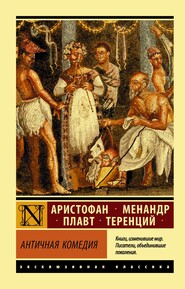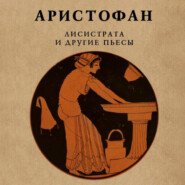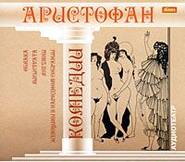По всем вопросам обращайтесь на: info@litportal.ru
(©) 2003-2024.
✖
The Eleven Comedies, Volume 1
Автор
Год написания книги
2018
Настройки чтения
Размер шрифта
Высота строк
Поля
SLAVE. He is and he isn't; understand that, if you have wit for't.
DICAEOPOLIS. How? He is and he isn't![207 - This whole scene is directed at Euripides; Aristophanes ridicules the subtleties of his poetry and the trickeries of his staging, which, according to him, he only used to attract the less refined among his audience.]
SLAVE. Certainly, old man; busy gathering subtle fancies here and there, his mind is not in the house, but he himself is; perched aloft, he is composing a tragedy.
DICAEOPOLIS. Oh, Euripides, you are indeed happy to have a slave so quick at repartee! Now, fellow, call your master.
SLAVE. Impossible!
DICAEOPOLIS. So much the worse. But I will not go. Come, let us knock at the door. Euripides, my little Euripides, my darling Euripides, listen; never had man greater right to your pity. It is Dicaeopolis of the Chollidan Deme who calls you. Do you hear?
EURIPIDES. I have no time to waste.
DICAEOPOLIS. Very well, have yourself wheeled out here.[208 - "Wheeled out"—that is, by means of the [Greek: ekkukl_ema], a mechanical contrivance of the Greek stage, by which an interior was shown, the set scene with performers, etc., all complete, being in some way, which cannot be clearly made out from the descriptions, swung out or wheeled out on to the main stage.]
EURIPIDES. Impossible.
DICAEOPOLIS. Nevertheless….
EURIPIDES. Well, let them roll me out; as to coming down, I have not the time.
DICAEOPOLIS. Euripides….
EURIPIDES. What words strike my ear?
DICAEOPOLIS. You perch aloft to compose tragedies, when you might just as well do them on the ground. I am not astonished at your introducing cripples on the stage.[209 - Having been lamed, it is of course implied, by tumbling from the lofty apparatus on which the Author sat perched to write his tragedies.] And why dress in these miserable tragic rags? I do not wonder that your heroes are beggars. But, Euripides, on my knees I beseech you, give me the tatters of some old piece: for I have to treat the Chorus to a long speech, and if I do it ill it is all over with me.
EURIPIDES. What rags do you prefer? Those in which I rigged out Aeneus[210 - Euripides delighted, or was supposed by his critic Aristophanes to delight, in the representation of misery and wretchedness on the stage. 'Aeneus,' 'Phoenix,' 'Philoctetes,' 'Bellerophon,' 'Telephus,' 'Ino' are titles of six tragedies of his in this genre of which fragments are extant.] on the stage, that unhappy, miserable old man?
DICAEOPOLIS. No, I want those of some hero still more unfortunate.
EURIPIDES. Of Phoenix, the blind man?
DICAEOPOLIS. No, not of Phoenix, you have another hero more unfortunate than him.
EURIPIDES. Now, what tatters does he want? Do you mean those of the beggar Philoctetes?
DICAEOPOLIS. No, of another far more the mendicant.
EURIPIDES. Is it the filthy dress of the lame fellow, Bellerophon?
DICAEOPOLIS. No, 'tis not Bellerophon; he, whom I mean, was not only lame and a beggar, but boastful and a fine speaker.
EURIPIDES. Ah! I know, it is Telephus, the Mysian.
DICAEOPOLIS. Yes, Telephus. Give me his rags, I beg of you.
EURIPIDES. Slave! give him Telephus' tatters; they are on top of the rags of Thyestes and mixed with those of Ino.
SLAVE. Catch hold! here they are.
DICAEOPOLIS. Oh! Zeus, whose eye pierces everywhere and embraces all, permit me to assume the most wretched dress on earth. Euripides, cap your kindness by giving me the little Mysian hat, that goes so well with these tatters. I must to-day have the look of a beggar; "be what I am, but not appear to be";[211 - Line borrowed from Euripides. A great number of verses are similarly parodied in this scene.] the audience will know well who I am, but the Chorus will be fools enough not to, and I shall dupe 'em with my subtle phrases.
EURIPIDES. I will give you the hat; I love the clever tricks of an ingenious brain like yours.
DICAEOPOLIS. Rest happy, and may it befall Telephus as I wish. Ah! I already feel myself filled with quibbles. But I must have a beggar's staff.
EURIPIDES. Here you are, and now get you gone from this porch.
DICAEOPOLIS. Oh, my soul! You see how you are driven from this house, when I still need so many accessories. But let us be pressing, obstinate, importunate. Euripides, give me a little basket with a lamp alight inside.
EURIPIDES. Whatever do you want such a thing as that for?
DICAEOPOLIS. I do not need it, but I want it all the same.
EURIPIDES. You importune me; get you gone!
DICAEOPOLIS. Alas! may the gods grant you a destiny as brilliant as your mother's.[212 - Report said that Euripides' mother had sold vegetables on the market.]
EURIPIDES. Leave me in peace.
DICAEOPOLIS. Oh! just a little broken cup.
EURIPIDES. Take it and go and hang yourself. What a tiresome fellow!
DICAEOPOLIS. Ah! you do not know all the pain you cause me. Dear, good Euripides, nothing beyond a small pipkin stoppered with a sponge.
EURIPIDES. Miserable man! You are robbing me of an entire tragedy.[213 - Aristophanes means, of course, to imply that the whole talent of Euripides lay in these petty details of stage property.] Here, take it and be off.
DICAEOPOLIS. I am going, but, great gods! I need one thing more; unless I have it, I am a dead man. Hearken, my little Euripides, only give me this and I go, never to return. For pity's sake, do give me a few small herbs for my basket.
EURIPIDES. You wish to ruin me then. Here, take what you want; but it is all over with my pieces!
DICAEOPOLIS. I won't ask another thing; I'm going. I am too importunate and forget that I rouse against me the hate of kings.—Ah! wretch that I am! I am lost! I have forgotten one thing, without which all the rest is as nothing. Euripides, my excellent Euripides, my dear little Euripides, may I die if I ask you again for the smallest present; only one, the last, absolutely the last; give me some of the chervil your mother left you in her will.
EURIPIDES. Insolent hound! Slave, lock the door.
DICAEOPOLIS. Oh, my soul! I must go away without the chervil. Art thou sensible of the dangerous battle we are about to engage upon in defending the Lacedaemonians? Courage, my soul, we must plunge into the midst of it. Dost thou hesitate and art thou fully steeped in Euripides? That's right! do not falter, my poor heart, and let us risk our head to say what we hold for truth. Courage and boldly to the front. I wonder I am so brave!
CHORUS. What do you purport doing? what are you going to say? What an impudent fellow! what a brazen heart! To dare to stake his head and uphold an opinion contrary to that of us all! And he does not tremble to face this peril! Come, it is you who desired it, speak!
DICAEOPOLIS. Spectators, be not angered if, although I am a beggar, I dare in a Comedy to speak before the people of Athens of the public weal; Comedy too can sometimes discern what is right. I shall not please, but I shall say what is true. Besides, Cleon shall not be able to accuse me of attacking Athens before strangers;[214 - 'The Babylonians' had been produced at a time of year when Athens was crowded with strangers; 'The Acharnians,' on the contrary, was played in December.] we are by ourselves at the festival of the Lenaea; the period when our allies send us their tribute and their soldiers is not yet. Here is only the pure wheat without chaff; as to the resident strangers settled among us, they and the citizens are one, like the straw and the ear.
I detest the Lacedaemonians with all my heart, and may Posidon, the god of Taenarus,[215 - Sparta had been menaced with an earthquake in 427 B.C. Posidon was 'The Earthshaker,' god of earthquakes, as well as of the sea.] cause an earthquake and overturn their dwellings! My vines also have been cut. But come (there are only friends who hear me), why accuse the Laconians of all our woes? Some men (I do not say the city, note particularly, that I do not say the city), some wretches, lost in vices, bereft of honour, who were not even citizens of good stamp, but strangers, have accused the Megarians of introducing their produce fraudulently, and not a cucumber, a leveret, a sucking-pig, a clove of garlic, a lump of salt was seen without its being said, "Halloa! these come from Megara," and their being instantly confiscated. Thus far the evil was not serious, and we were the only sufferers. But now some young drunkards go to Megara and carry off the courtesan Simaetha; the Megarians, hurt to the quick, run off in turn with two harlots of the house of Aspasia; and so for three gay women Greece is set ablaze. Then Pericles, aflame with ire on his Olympian height, let loose the lightning, caused the thunder to roll, upset Greece and passed an edict, which ran like the song, "That the Megarians be banished both from our land and from our markets and from the sea and from the continent."[216 - A song by Timocreon the Rhodian, the words of which were practically identical with Pericles' decree.] Meanwhile the Megarians, who were beginning to die of hunger, begged the Lacedaemonians to bring about the abolition of the decree, of which those harlots were the cause; several times we refused their demand; and from that time there was a horrible clatter of arms everywhere. You will say that Sparta was wrong, but what should she have done? Answer that. Suppose that a Lacedaemonian had seized a little Seriphian[217 - A small and insignificant island, one of the Cyclades, allied with the Athenians, like most of these islands previous to and during the first part of the Peloponnesian War.] dog on any pretext and had sold it, would you have endured it quietly? Far from it, you would at once have sent three hundred vessels to sea, and what an uproar there would have been through all the city! there 'tis a band of noisy soldiery, here a brawl about the election of a Trierarch; elsewhere pay is being distributed, the Pallas figure-heads are being regilded, crowds are surging under the market porticos, encumbered with wheat that is being measured, wine-skins, oar-leathers, garlic, olives, onions in nets; everywhere are chaplets, sprats, flute-girls, black eyes; in the arsenal bolts are being noisily driven home, sweeps are being made and fitted with leathers; we hear nothing but the sound of whistles, of flutes and fifes to encourage the work-folk. That is what you assuredly would have done, and would not Telephus have done the same? So I come to my general conclusion; we have no common sense.
FIRST SEMI-CHORUS. Oh! wretch! oh! infamous man! You are naught but a beggar and yet you dare to talk to us like this! you insult their worships the informers!
SECOND SEMI-CHORUS. By Posidon! he speaks the truth; he has not lied in a single detail.











